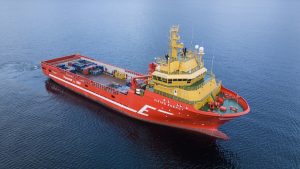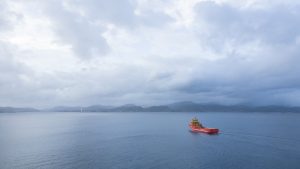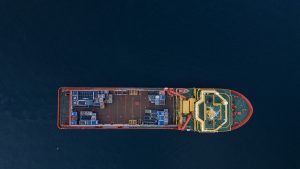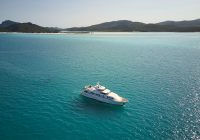Shipowner Eidesvik Offshore and partners will make “Viking Energy” the world’s first ammonia-powered platform supply vessel. In 2026, the vessel will operate on ammonia for Equinor, reducing GHG emissions by 70 percent or more.

The technology will be demonstrated onboard Eidesvik Offshore’s PSV Viking Energy, in operation for Equinor. Photo credit: Peter Tubaas.
With €5 million in EU support, the Apollo project will see a dual-fuel engine able to operate on ammonia installed in Viking Energy. The project placed a purchase order for the Wärtsilä 25 engine and complete fuel gas supply system in July.
The platform supply vessel is owned and operated by Eidesvik Offshore, and the Norwegian shipowner will demonstrate the technology in an operational environment on contract for Equinor.
“Apollo represents an important step in our journey towards carbon-free shipping operations. Eidesvik has a unique history as a pioneer in showcasing new technologies to curb emissions, and we take pride in once again assuming this role alongside Equinor”, says CEO & President of Eidesvik Offshore, Gitte Gard Talmo.
The partners will prepare different modular designs and concepts, allowing the quick adoption of ammonia engines as an alternative for both existing and new ships. VTT leads the work to scale the learnings from the demonstrator ship to other vessel types. The concept will include safety and monitoring systems and fuel gas supply systems. Ship design services will be delivered from Breeze Ship Design, and the complete ammonia solution from the engine, fuel gas supply system and service agreement are provided by Wärtsilä.

In 2026, Viking Energy will operate on ammonia with a new dual-fuel engine, reducing GHG emissions by 70 percent or more. Photo credit: Peter Tubaas.
Market Changer in Time for 2030
Emissions from waterborne shipping are a major challenge, and the European industry is on a mission to reduce its greenhouse gas emissions by 50 percent by 2030. The Apollo concept can play a vital part in demonstrating the needed solutions, as the technology will suit large parts of the European fleet.
The design will be adapted to allow shipowners, ship designers, shipyards, classification agencies, and insurance companies to adopt the Apollo solution into their decision-making processes as early as 2027. Norwegian Maritime CleanTech is leading the EU project.
“This will be a real game-changer when it comes to meeting the climate goals for 2030, as it can be adapted to virtually all types of vessels, both on the Norwegian shelf and internationally. The concept’s market potential is huge”, says Maritime CleanTech CEO, Ada M. Jakobsen.
The partners will also map the existing supply chain of green ammonia in Europe and stake out the needed bunkering infrastructure to serve marine and inland vessels.
The Apollo project, which has received funding through the EU’s Horizon Europe programme, is run by a consortium of eight European companies and institutions. National Centre for Scientific Research Demokritos is responsible for assessing safety criteria, while partners VTT and Belgian contractor and shipowner DEME will simulate other vessel types and operating scenarios to illustrate the ability to transfer the technology to other segments of the shipping industry.
Viking Energy is also a demonstrator vessel in the EU-funded ShipFC project, which aims to pilot ammonia-powered fuel cells.

Whilst demonstrating the technology on Viking Energy, the project partners will prepare different modular designs and concepts, allowing the quick adoption of ammonia engines as an alternative for both existing and new ships. Photo credit: Peter Tubaas.
Consortium members:
Eidesvik Offshore ASA (Norway) owns and operates a worldwide fleet of purpose-built vessels that provide services to the offshore supply, subsea, and offshore wind markets. The company is a pioneer in implementing new environmental technologies in both new builds and its existing fleet.
Equinor (Norway) Equinor is the leading operator on the Norwegian continental shelf and is present in around 30 countries worldwide. Their portfolio of projects encompasses oil and gas, renewables, and low-carbon solutions, and they aim to become a net-zero energy company by 2050.
Wärtsilä (Finland) is a global leader in innovative technologies and complete lifecycle solutions for the marine and energy markets. Within the marine industry, Wärtsilä emphasizes maximizing the environmental and economic performance of vessels driving the industry forward on its journey towards decarbonisation.
Maritime CleanTech (Norway) is a world-leading network for developing clean maritime solutions. Together with its partners, it pioneers groundbreaking technologies and solutions that are key to accelerating the transition towards emission-free maritime industries.
Breeze Ship Design (Norway) is an independent ship design company that offers innovative designs that focus on environmental compliance with known and future rules and regulations.
VTT Technical Research Centre of Finland VTT is a visionary research, development and innovation partner driving sustainable growth. With over 80 years of experience in cutting-edge research and science-based results, VTT tackles the biggest global challenges of our time and turns them into growth opportunities.
Deme Group NV (Belgium) is a marine sustainable solutions provider that operates a fleet of over 100 specialised vessels. The Company offers dredging, land reclamation, marine infrastructure, offshore energy, and environmental remediation and serves clients worldwide.
National Centre of Scientific Research “Demokritos” (Greece) is Greece’s largest multidisciplinary research centre, focusing on basic and applied research in Nanotechnology and Advanced Materials, Energy and environment, Biosciences, Nuclear and Particle Physics, and Informatics and telecommunications.
Funding:
This project has received funding from the European Union’s Horizon programme under grant agreement No. 101096299.
The Horizon Europe framework programme aims to accelerate the transition towards a climate-neutral Europe by 2050 by funding projects that contribute to research and innovative solutions in various sectors related to climate, energy, and mobility.







